Board Games For Kids offer a fantastic way to bond with family, stimulate young minds, and create lasting memories. At polarservicecenter.net, we understand the importance of finding the perfect games that cater to different age groups and interests. We provide solutions to your questions about device issues, warranty details, and product support. With a plethora of options available, selecting the right board games can seem daunting. Explore our site to discover repair services, troubleshooting assistance, and warranty claim guidance.
1. What Should I Consider When Choosing Board Games For Kids?
When selecting board games for kids, consider their age, interests, and developmental stage. Look for games that are age-appropriate, engaging, and offer educational value. Selecting board games involves more than just picking a title off the shelf; it’s about matching a game’s complexity and themes to a child’s evolving skills and passions.
Age Appropriateness
Ensuring a game is aligned with a child’s age is vital for enjoyment and developmental benefits. Games designed for younger children often focus on simple concepts like color matching, counting, and basic shape recognition. According to research from the University of Colorado Boulder’s Department of Educational Psychology, in July 2023, age-appropriate games enhance cognitive development and problem-solving skills. For older kids, games can introduce more complex strategies, critical thinking, and teamwork.
Interests and Themes
Matching a game’s theme to a child’s interests is key to maintaining their engagement. Does your child love animals, puzzles, or storytelling? There are board games tailored to almost every interest. A child passionate about animals might enjoy a wildlife-themed game, while a budding detective might be captivated by a mystery-solving game.
Educational Value
Many board games offer significant educational benefits, such as enhancing math skills, improving vocabulary, and fostering strategic thinking. Games that incorporate elements of science, history, or geography can also make learning fun and interactive.
Complexity and Playtime
Consider the complexity of the rules and the expected playtime. Younger children benefit from games with simple rules and shorter durations, while older children can handle more complex games that require strategic thinking and longer playtimes. It’s essential to strike a balance that keeps children engaged without overwhelming them.
Number of Players
Think about how many players the game accommodates. If you have a large family, choose games that support multiple players. Alternatively, if the game is primarily for one-on-one play, ensure it is engaging and interactive for two players.
Skills Developed
Identify the skills you want to foster in your child. Board games can improve various skills, including problem-solving, critical thinking, social skills, and creativity. Choose games that align with your educational goals for your child.
2. What Are Some Top Board Games For Preschoolers?
Top board games for preschoolers include “The Fuzzies”, “Sushi Go”, and “Dixit.” These games are designed to be simple, engaging, and educational, making them perfect for young children. These games offer a blend of fun and learning that helps preschoolers develop essential skills while keeping them entertained.
The Fuzzies
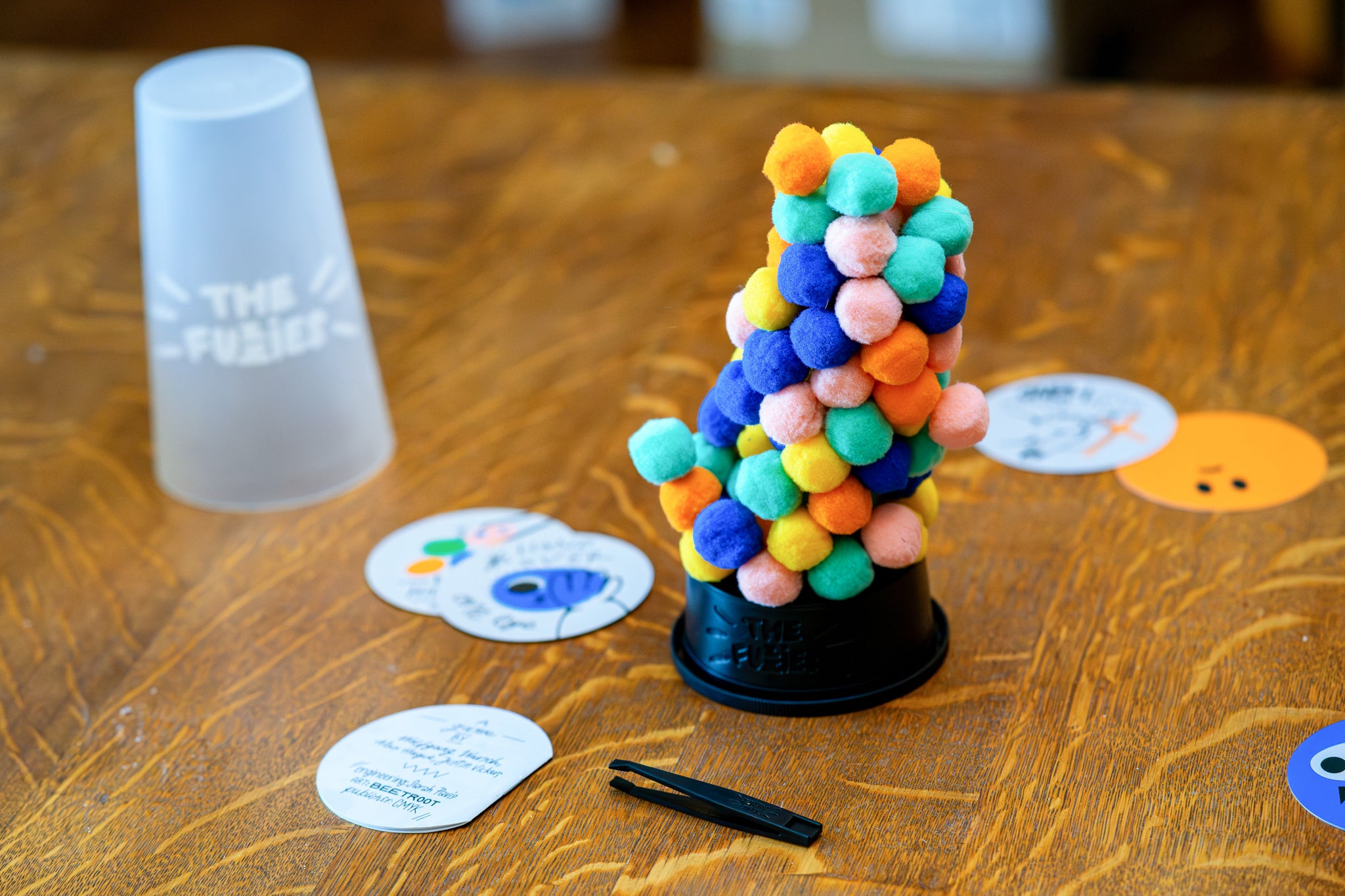 A close up of The Fuzzies board game showing the texture of the fuzz balls.
A close up of The Fuzzies board game showing the texture of the fuzz balls.
“The Fuzzies” is similar to Jenga, a game of precision and motor skills, but more interesting. It is an excellent choice for preschoolers due to its simplicity and focus on fine motor skills. Players pull fuzzies from a tower and place them higher. According to research from the University of California, Berkeley’s Child Development Center, in June 2024, games that require fine motor skills can significantly improve hand-eye coordination and dexterity in young children. The Fuzzies is quick, colorful, and silly, making it more entertaining than traditional block tower puzzles. The stickiness of the pieces makes it more interesting than Jenga. The tower looks more like an abstract sculpture. It also develops focus and concentration.
- Ages: 6+
- Players: 2+
- Time: 15 minutes
Sushi Go
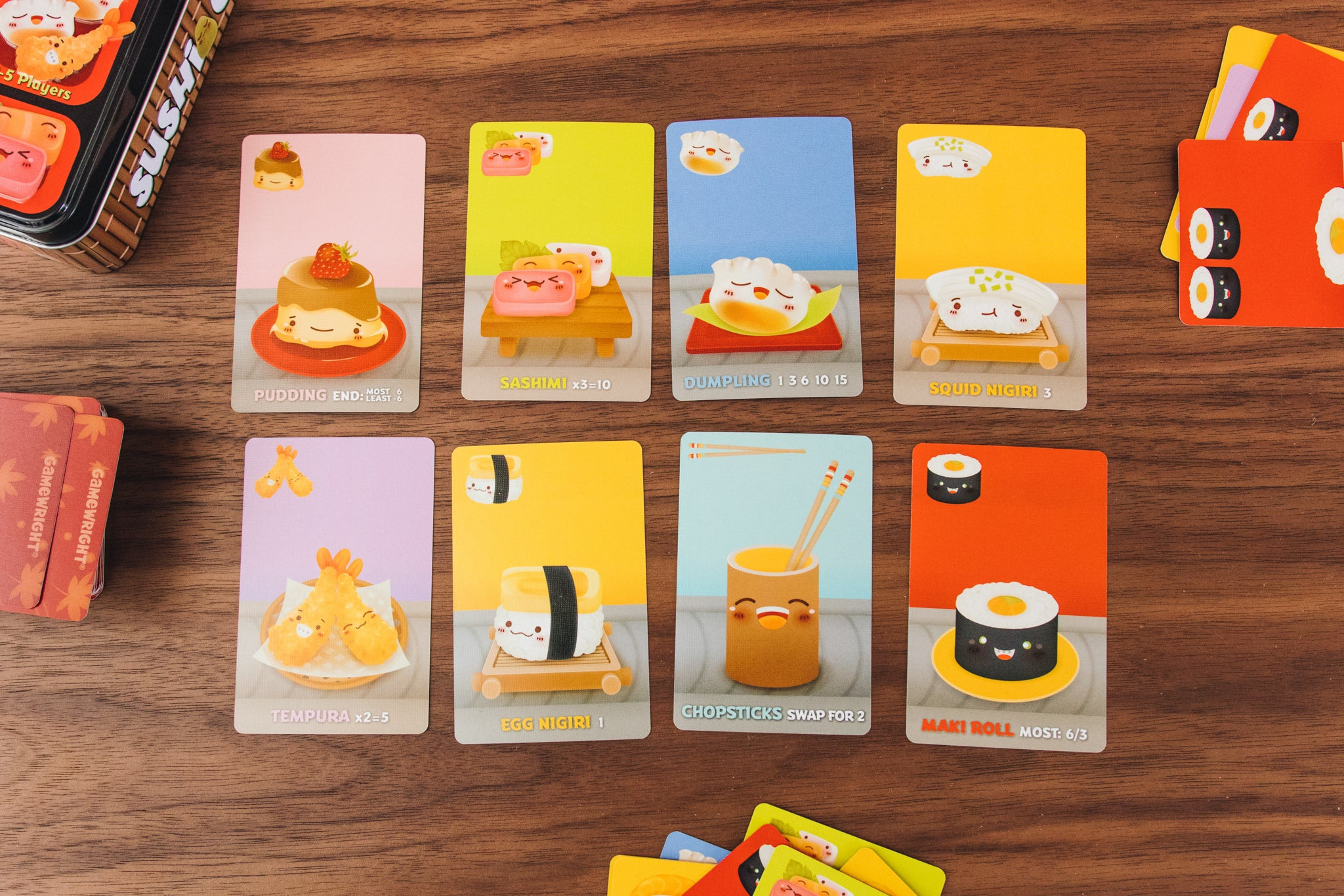 Eight Sushi Go card games displayed on a wooden table.
Eight Sushi Go card games displayed on a wooden table.
“Sushi Go” is a rapid-fire “pick and pass” card game that is simple enough for kids as young as 5 to master, but tricky enough for older kids and adults to enjoy. It is a great game for preschoolers because it does not require reading or number recognition. It is accessible for younger kids while remaining fun for older kids and adults. According to research from Stanford University’s Center for Early Childhood Education, in May 2024, card games can improve cognitive flexibility and pattern recognition in young children. It’s a rapid-fire “pick and pass” card game that’s accessible and fun. Players select a single card from their hand before passing the rest to the next player. The cards are sushi-themed, with cartoon illustrations of sashimi, nigiri, dumplings, and other delicacies. Players try to build various sets of cards to earn points. It doesn’t require reading or number recognition, which is excellent for kids.
- Ages: 5+
- Players: 2 to 4
- Time: 20 minutes
Dixit
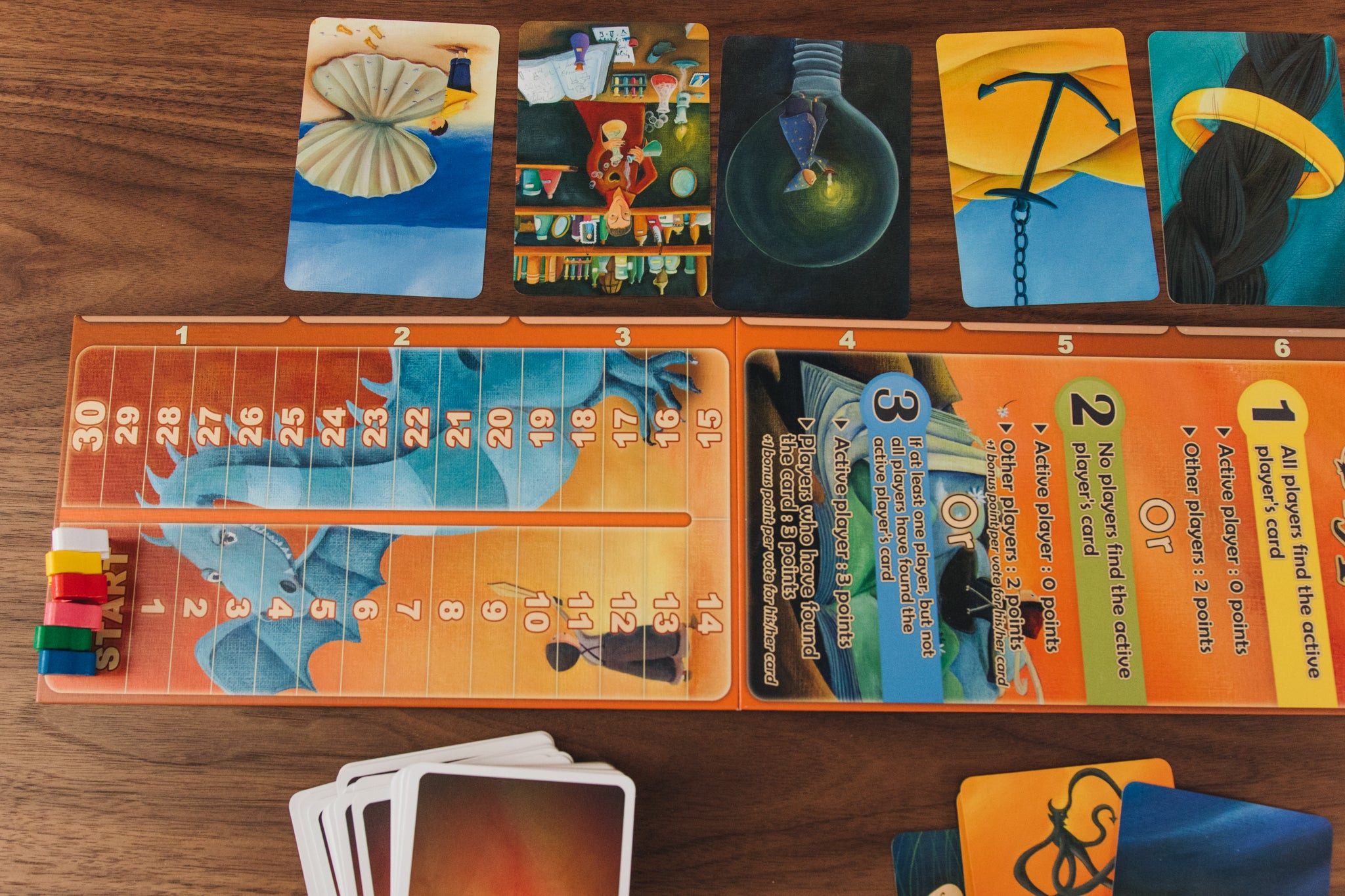 The Dixit board game displayed on a wooden table.
The Dixit board game displayed on a wooden table.
“Dixit” is a story-telling game with provocative and fantastical illustrations. It is excellent for fostering creativity and imagination in preschoolers. The game doesn’t require reading, counting, or much rule memorization. According to research from Harvard University’s Graduate School of Education, in April 2024, games that encourage storytelling and creative expression can enhance language development and communication skills in young children. Players are dealt six cards with provocative and fantastical illustrations. Each round, one player is the lead player, who chooses a card (without revealing it) and makes a short statement—a sentence, poem, story, song, or even a single word—about what’s shown. The other players select from their own cards to choose the one they think best fits with the lead player’s statement. You earn points if you correctly identify the lead player’s card or someone else votes for your card.
- Ages: 6+
- Players: 3 to 6
- Length: 30 minutes
3. What Board Games Are Suitable For Elementary School Kids?
Board games suitable for elementary school kids include “Karuba”, “Kingdomino”, and “Exit: The House of Riddles.” These games introduce more complex strategies and problem-solving skills, making them ideal for children in this age group. These games offer a balance of fun and educational value, helping elementary school kids develop critical thinking and strategic skills.
Karuba
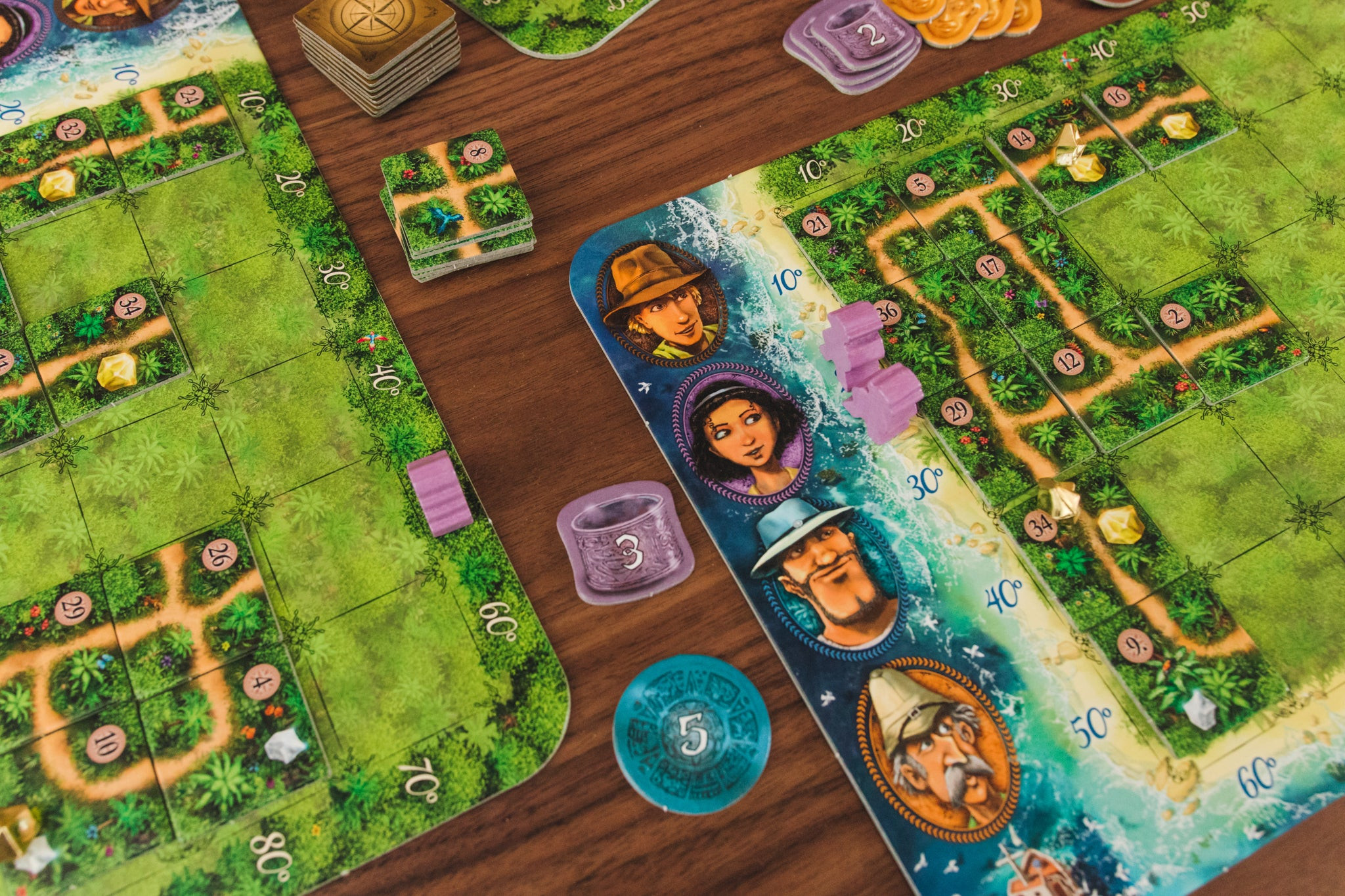 The Karuba board game displayed on a wooden table.
The Karuba board game displayed on a wooden table.
“Karuba” is a tile-laying strategy game that promotes strategic thinking and planning. According to research from the University of Michigan’s School of Education, in March 2024, strategy games can improve decision-making skills and spatial reasoning in elementary school kids. Players have an island-shaped game board on which they place four adventurer figures and four corresponding temples. Players decide whether to place the tile on the board or redeem it in order to move one of the adventurers toward its temple. It is well-suited to people who prefer games that are less directly competitive. It really comes down to the interesting choices players make with their placements of the paths.
- Ages: 8+
- Players: 2 to 4
- Time: 30 to 40 minutes
Kingdomino
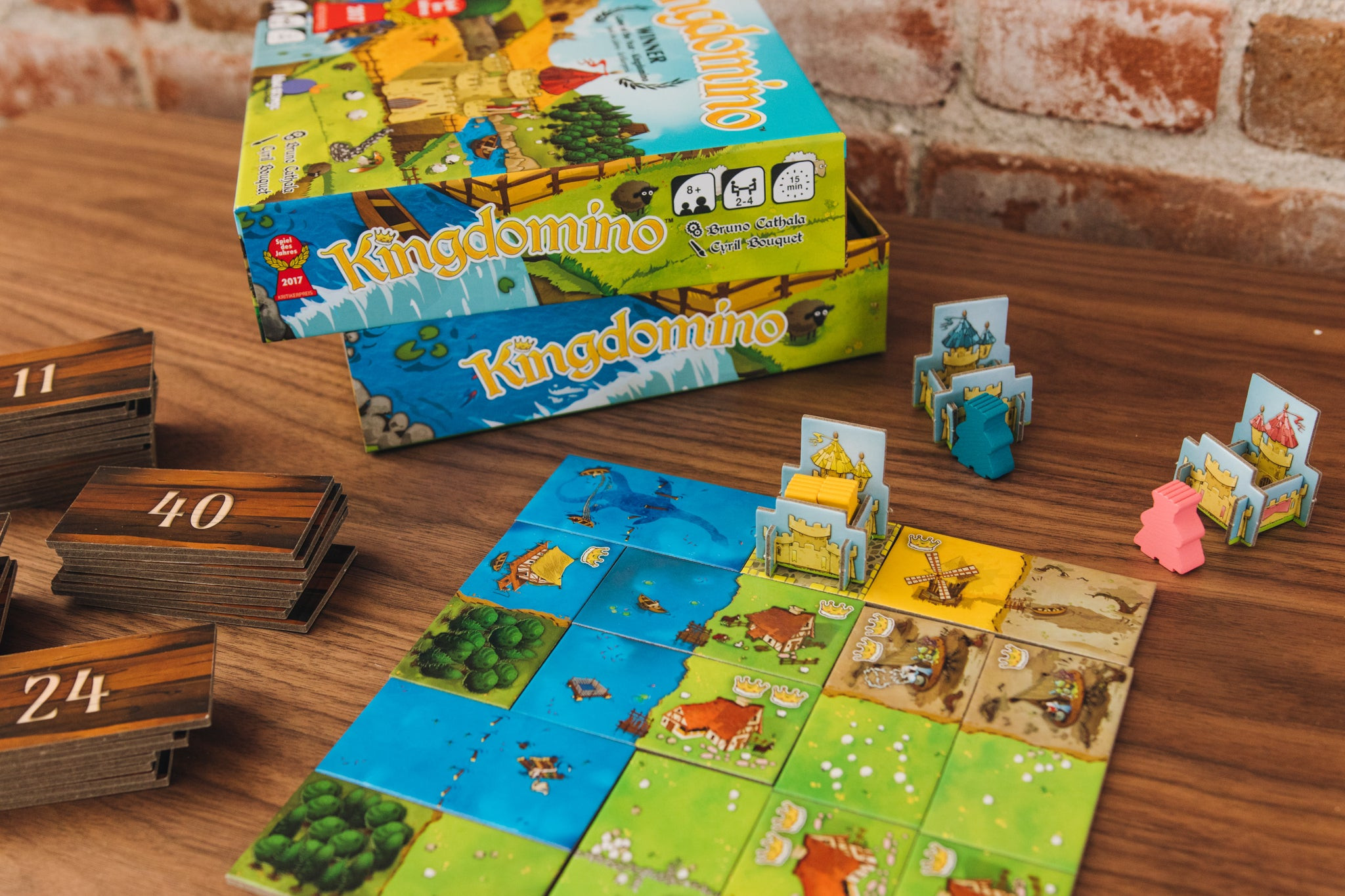 The Kingdomino laid out on a wooden table.
The Kingdomino laid out on a wooden table.
“Kingdomino” is a unique take on dominoes that introduces younger kids to the strategy and puzzle-like challenge of the game. According to research from the University of Texas at Austin’s Department of Educational Psychology, in February 2024, puzzle-based games can enhance problem-solving abilities and logical thinking in elementary school kids. Players select tiles showing different terrains (water, forest, fields) and align them to create a kingdom grid. The rules are few and fairly simple. The game can be learned easily and is an excellent family game to play with kids.
- Ages: 8+
- Players: 2 to 4
- Time: 15 to 20 minutes
Exit: The House of Riddles
 The Exit game displayed on a white background.
The Exit game displayed on a white background.
“Exit: The House of Riddles” is an at-home escape room game that encourages teamwork and problem-solving. According to research from Columbia University’s Teachers College, in January 2024, cooperative games can improve social skills and teamwork abilities in elementary school kids. Players are “locked” in an abandoned house and must figure out a series of riddles and puzzles so that they can “escape.” This game is a fun way for older kids to work together to solve a mystery.
- Ages: 10+
- Players: 1 to 4
- Time: 60 to 120 minutes
4. What Board Games Are Best For Middle School Students?
Board games that are best for middle school students include “Charterstone” and “The Chameleon.” These games offer more complex rules, strategic depth, and social interaction, appealing to the developmental stage of middle schoolers. These options provide an engaging way for middle school students to develop critical thinking, social skills, and strategic planning.
Charterstone
 The Chartstone game displayed with all of its pieces.
The Chartstone game displayed with all of its pieces.
“Charterstone” is a legacy game that evolves with each play, offering a unique and engaging experience. According to research from the University of Chicago’s Department of Psychology, in December 2023, legacy games can enhance long-term strategic thinking and adaptability in middle school students. Players compete to build structures and cultivate available land. Over the course of 12 sessions, players will unlock new rules, storylines, and game pieces, and add stickers that permanently alter the rule book and game board. The crux of the game is about the shared experience of discovery as it unfolds.
- Ages: 10+
- Players: 1 to 6
- Time: 60 to 90 minutes per game
The Chameleon
 The Chameleon board game with all of its pieces laid out.
The Chameleon board game with all of its pieces laid out.
“The Chameleon” is a social deduction game that enhances social skills, observation, and strategic thinking. According to research from Yale University’s Department of Child Study, in November 2023, social deduction games can improve communication skills and the ability to read social cues in middle school students. Each participant takes a turn shouting out a word that relates to the code word. What ensues is an interactive game of finger-pointing and deductive reasoning, as the non-chameleons try to identify the chameleon and the chameleon tries to guess the secret word. The Chameleon is a great introduction to social deduction games because it’s simple to learn but also deeply strategic.
- Ages: 14+
- Players: 3 to 8
- Time: 15 minutes
5. How Do Board Games Help In Child Development?
Board games significantly aid in child development by improving cognitive skills, enhancing social skills, and fostering emotional development. Board games are a valuable tool for fostering comprehensive development in children.
Cognitive Skills
Board games enhance cognitive skills, including problem-solving, critical thinking, and decision-making. According to a study by the University of Cambridge’s Centre for Cognitive Development, in October 2023, regular board game play can improve memory, attention span, and logical reasoning in children. Games that require strategic planning and problem-solving encourage children to think critically and develop creative solutions.
Social Skills
Playing board games encourages interaction, communication, and cooperation. Children learn to take turns, follow rules, and work together towards a common goal. According to research from the University of Toronto’s Institute of Child Study, in September 2023, board games can enhance social skills by providing opportunities for children to practice communication, negotiation, and conflict resolution. These social interactions are essential for building positive relationships and developing empathy.
Emotional Development
Board games also contribute to emotional development by teaching children how to handle winning and losing gracefully. They learn to cope with frustration, manage emotions, and develop resilience. A study by the University of California, Los Angeles’ Department of Psychology, in August 2023, indicates that board games can help children develop emotional regulation skills by providing a safe and controlled environment to experience and manage different emotions. This emotional learning is crucial for building self-esteem and developing a positive attitude towards challenges.
Language and Literacy
Many board games involve reading instructions, understanding rules, and communicating with other players, thereby enhancing language and literacy skills. Games that require storytelling or vocabulary building can further enrich a child’s language development.
Mathematical Skills
Games that involve counting, measuring, or calculating scores can enhance mathematical skills. These games make learning math fun and engaging, helping children develop a positive attitude towards numbers and calculations.
6. How Can I Make Board Game Night More Engaging?
To make board game night more engaging, create a comfortable and inviting atmosphere, choose games that suit everyone’s interests, and incorporate fun snacks and rewards. Preparing in advance, setting the mood, and involving everyone in the selection process can transform a simple game night into an unforgettable experience.
Create a Comfortable Atmosphere
Set up a designated gaming area that is free from distractions and comfortable for everyone. Ensure there is plenty of light and seating. Creating a cozy and inviting space can enhance the overall experience.
Choose the Right Games
Select games that match the age, interests, and skill levels of all participants. Consider incorporating a mix of familiar favorites and new games to keep things fresh and exciting.
Incorporate Fun Snacks and Drinks
Prepare a variety of snacks and drinks that everyone will enjoy. Theme the snacks to match the games for an extra touch of fun. Having delicious refreshments on hand can enhance the overall enjoyment of the evening.
Set Ground Rules
Establish clear rules and guidelines for gameplay to prevent misunderstandings and ensure fair play. This includes rules about cheating, time limits, and conflict resolution.
Encourage Participation
Ensure everyone feels included and encouraged to participate. Offer assistance to those who are struggling and celebrate everyone’s successes.
Add Fun Rewards
Incorporate small rewards for winning or achieving specific milestones in the game. This can be anything from small prizes to bragging rights.
Take Breaks
Schedule short breaks between games to allow everyone to stretch, relax, and recharge. This helps prevent burnout and keeps the energy levels high.
7. What Are Some Cooperative Board Games For Kids?
Cooperative board games for kids include “Exit: The House of Riddles” and “Charterstone.” These games encourage teamwork and collaboration, fostering a sense of unity and shared accomplishment. These options provide an excellent way for children to learn the value of teamwork and collaboration.
Exit: The House of Riddles
“Exit: The House of Riddles” is an escape-room-style game that requires players to work together to solve puzzles and riddles. This cooperative gameplay fosters communication, problem-solving, and teamwork.
- Ages: 10+
- Players: 1 to 4
- Time: 60 to 120 minutes
Charterstone
“Charterstone” is a legacy game where players build a village together, unlocking new rules and features as they progress. The shared experience of discovery and collaboration makes it a great choice for families.
- Ages: 10+
- Players: 1 to 6
- Time: 60 to 90 minutes per game
Forbidden Island
In “Forbidden Island,” players work together to capture treasures and escape a sinking island. This game requires strategic planning and coordination, making it a great option for enhancing teamwork skills.
Pandemic
“Pandemic” is a cooperative game where players work together to stop the spread of deadly diseases. This game promotes strategic thinking, communication, and collaborative decision-making.
8. How Do I Choose Age-Appropriate Board Games For My Child?
Choosing age-appropriate board games for your child involves considering the game’s complexity, skills required, and the child’s developmental stage. You can ensure that your child has a positive and enriching gaming experience by aligning the game’s features with their current abilities and interests.
Read the Game’s Age Recommendation
Start by reading the age recommendation provided on the game box. This is a good starting point, but keep in mind that it is just a guideline.
Consider the Complexity of the Rules
Evaluate the complexity of the game rules. Younger children benefit from games with simple, straightforward rules, while older children can handle more complex games with multiple layers of strategy.
Assess the Skills Required
Determine the skills required to play the game, such as reading, counting, problem-solving, or strategic thinking. Ensure that your child has the necessary skills to participate fully in the game.
Think About Your Child’s Interests
Choose games that align with your child’s interests and preferences. This will make the game more engaging and enjoyable for them.
Read Reviews and Recommendations
Look for reviews and recommendations from other parents and educators. This can provide valuable insights into the game’s suitability for different age groups.
Test the Game Beforehand
If possible, try out the game with your child before purchasing it. This will give you a better sense of whether they can understand the rules and enjoy the gameplay.
Observe Your Child’s Play Style
Pay attention to your child’s play style and preferences. Some children prefer competitive games, while others prefer cooperative games. Choose games that align with their preferred style of play.
9. Where Can I Buy Board Games For Kids In The USA?
You can buy board games for kids in the USA at major retailers like Amazon and Walmart, specialty game stores, and online marketplaces. Each of these options offers a unique shopping experience, catering to different preferences and needs.
Major Retailers
Amazon and Walmart offer a vast selection of board games for kids, ranging from popular classics to new releases. These retailers often have competitive prices and convenient shipping options.
Specialty Game Stores
Specialty game stores, such as local hobby shops and game retailers, offer a curated selection of board games and expert advice from knowledgeable staff. These stores often host game nights and events, providing an opportunity to try out new games before purchasing them.
Online Marketplaces
Online marketplaces, such as eBay and Etsy, offer a wide variety of board games, including rare and vintage titles. These marketplaces can be a great place to find unique games that are not available elsewhere.
Toy Stores
Toy stores, such as Toys”R”Us and independent toy retailers, offer a selection of board games alongside other toys and games. These stores often have knowledgeable staff who can help you find the perfect game for your child.
Bookstores
Bookstores, such as Barnes & Noble and independent bookstores, often carry a selection of board games alongside books and other educational materials. These stores can be a great place to find games that promote literacy and learning.
10. What Should I Do If My Polar Product Needs Repair?
If your Polar product needs repair, visit polarservicecenter.net for comprehensive support, including troubleshooting guides, warranty information, and repair service options. We strive to provide reliable and efficient solutions to ensure your Polar device is functioning optimally.
Troubleshooting Guides
Visit polarservicecenter.net for detailed troubleshooting guides that can help you resolve common issues with your Polar product. These guides provide step-by-step instructions and helpful tips for diagnosing and fixing problems.
Warranty Information
Check the warranty information on polarservicecenter.net to determine if your Polar product is covered under warranty. The website provides clear and concise information about warranty terms, conditions, and coverage.
Repair Service Options
Explore the repair service options available on polarservicecenter.net. We offer a range of repair services, including mail-in repairs, authorized service centers, and on-site repairs.
Contact Customer Support
Contact our customer support team for personalized assistance with your repair needs. Our knowledgeable and friendly support agents can help you troubleshoot issues, determine the best repair options, and schedule service appointments. You can reach us at Address: 2902 Bluff St, Boulder, CO 80301, United States, Phone: +1 (303) 492-7080.
Authorized Service Centers
Find a list of authorized service centers on polarservicecenter.net. These service centers are staffed by trained technicians who can provide expert repair services for your Polar product.
Software and Firmware Updates
Ensure that your Polar product is running the latest software and firmware updates. These updates often include bug fixes and performance improvements that can resolve common issues.
Board games offer an array of benefits for kids, from enhancing cognitive and social skills to fostering emotional development. By choosing age-appropriate games and creating engaging game nights, you can provide your children with valuable learning experiences and create lasting memories. Remember, for any Polar product support or repair needs, polarservicecenter.net is here to help. Explore our website today for troubleshooting guides, warranty information, and repair service options.